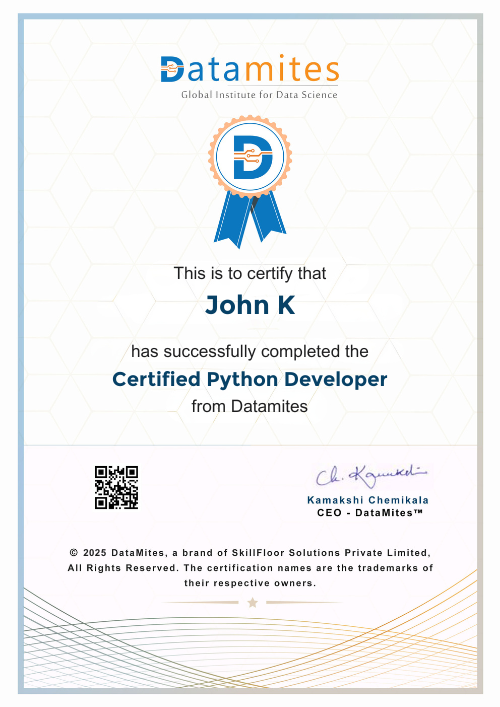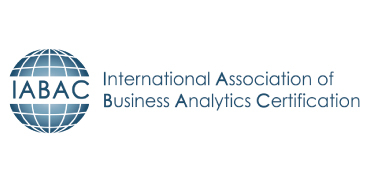Instructor Led Live Online
Self Learning + Live Mentoring
Customize Your Training

• Introduction of python
• Installation of Python and IDE
• Python Variables
• Python basic data types
• Number & Booleans, strings
• Arithmetic Operators
• Comparison Operators
• Assignment Operators
• IF Conditional statement
• IF-ELSE
• NESTED IF
• Python Loops basics
• WHILE Statement
• FOR statements
• BREAK and CONTINUE statements
• Basic data structure in python
• Basics of List
• List: Object, methods
• Tuple: Object, methods
• Sets: Object, methods
• Dictionary: Object, methods
• Functions basics
• Function Parameter passing
• Lambda functions
• Map, reduce, filter functions
• Decorators
• Generators
• Context Managers
• Metaclasses
• Inheritance and Polymorphism
• Encapsulation and Abstraction
• Class methods and static methods
• Special (magic/dunder) methods
• Property decorators - getters, setters, and deletes
• Working with files
• Reading and writing files
• Buffered read and write
• Other file methods
• Logging & Debugger
• Modules and import statements
• SQL Basics
• Creating DB Table
• INSERT, READ, UPDATE, DELETE
• Introduction to MongoDB
• CRUD operations in MongoDB
• namedtuple(), deque, ChainMap,
• Counter, OrderedDict, defaultdict,
• UserDict, UserList, UserString
• Exceptions handling with try-except
• Custom exception handling
• List of general use exception
• Best practice exception handling
• Generators, Iterators
• The Functions any and all
• With Statement
• Data Compression
• A Daytime Server
• Clients and Servers
• The Client and Server Programs
• Classes and Threads
• Multi-threading; thread life cycle
• Regular Expression Syntax
• Group, Split and wildcards
• Quantifiers
• Match, Search and Find all methods
• Character Sequence
• Introduction to OpenCV, Installation
• Basic Operations on Images
• Image Filtering
• Image Classification
• Introduction to GIT
• Basic Git commands
• Introduction to Flask and Installation
• Creating project
• Routing,templates, forms and database integration
• Deployment on render
• Django Introduction and Installation
• Creating a Project
• Django Architecture and File Structure
• Folder Structure, First Django project
• Database and Views, Static Files and Forms
• URL Mapping and Routing
• Defining Models and Relationships
• Database Migrations and Schema Changes
• Querying Data using Django ORM
• Model Forms and Form Validation
• HTML Forms in Django
• Model Forms and Form Validation
• Formsets and Inline Formsets
• File Uploads and Validation
• Deploying Django Applications
• Hosting Options (e.g., Heroku, AWS)
• Project Showcasing and Review
Python is a high-level, interpreted programming language that was first released in 1991. It is designed to be easy to read, write and understand, making it an excellent language for beginners to learn. Python is used for a wide range of applications, including web development, scientific computing, data analysis, artificial intelligence, machine learning, and more. Python is known for its simplicity, readability, and elegant syntax, which allows developers to write code that is both concise and easy to understand. Additionally, Python is an open-source language, meaning that it is free to use, modify and distribute, making it a popular choice among developers and organizations around the world.
Python is used for a wide variety of applications, including web development, scientific computing, data analysis, artificial intelligence, machine learning, automation, and more. Its versatility, simplicity, and extensive libraries make it an ideal choice for developers and organizations looking to build robust and scalable applications. Python's popularity and ease of use have also led to a vibrant community of developers who contribute to its growth by creating new libraries, frameworks, and tools.
It's difficult to say which programming language is superior, Python or C++, as both have their own strengths and weaknesses. Python is known for its ease of use, readability, and extensive libraries, making it an excellent language for beginners and a popular choice for data analysis, scientific computing, and web development. C++, on the other hand, is known for its speed, efficiency, and ability to handle low-level programming tasks, making it a popular choice for developing high-performance applications, games, and operating systems. Ultimately, the choice between Python and C++ will depend on the specific needs of the project and the skillset of the developer.
Python is considered an easy language to learn for beginners due to its simple and intuitive syntax. It also has a large community of developers and a vast collection of libraries and frameworks, making it easier to find resources and get help when needed. However, like any programming language, mastering Python takes time and practice.
Python is used in various industries and job roles, such as data science, machine learning, artificial intelligence, web development, software development, scientific computing, automation, and more. In particular, data analysts, data scientists, software engineers, web developers, and research scientists often use Python in their work. The versatility and wide range of applications of Python have made it a popular choice for many different professions.
Anyone who is interested in learning Python can take up Python courses, as there are no specific eligibility criteria for learning the language. Python is suitable for beginners as well as experienced programmers who want to learn a new language or upgrade their skills. It is an easy-to-learn language, making it a popular choice for beginners in the field of programming.
The fees for Python courses can vary based on the level of training being offered. Generally, the fee structure for classroom training by different providers in Python ranges from 200 GBP to 400 GBP.
The fundamental abilities required for learning Python include basic knowledge of programming concepts such as loops, functions, and conditional statements. Familiarity with basic mathematical concepts, logical reasoning, and problem-solving skills can also be helpful in learning Python. Additionally, a willingness to learn and practice consistently is crucial for mastering any programming language, including Python.
The average duration for Python training can vary depending on the level of the course, the intensity of the training, and the mode of delivery. Typically, a basic Python course may take around 4 to 10 weeks to complete, while an advanced course may take anywhere from 10 to 15 weeks. Online Python courses may have a slightly different duration compared to classroom-based training.
As per Indeed.com, the average salary for a python developer in UK is £77,077 per annum.
DataMites is an institute that offers the best Python training in the UK. Their Python training program is comprehensive and covers all the essential aspects of Python programming, catering to both beginners and advanced learners.
The Certified Python Developer course is the best course in learning python with hands-on experience through practical exercises and real-world projects. The course is taught by experienced trainers who provide personalized attention to each learner, ensuring that they understand the concepts thoroughly. Upon completion of the course, learners receive a globally recognized certification from IABAC, which adds significant value to their resume and career prospects. Overall, the Certified Python Developer course is the best option for anyone looking to learn Python and establish a successful career in the field.
There are no specific prerequisites for the DataMites Certified Python Developer Training in the UK. However, a basic knowledge of programming concepts and logic will be an added advantage. The course is designed for both beginners and experienced professionals who want to enhance their skills in Python programming.
Taking Python Training from DataMites has several benefits. Their comprehensive curriculum covers all the essential aspects of Python programming and is taught by experienced trainers who provide personalized attention to each learner. The online Python course in the UK offered by DataMites provides learners with the flexibility to learn at their own pace and convenience. Additionally, the course is authorized by international bodies called IABAC, ensuring that learners receive a globally recognized certification upon completion. DataMites also offers a Python Course with Internship in the UK, allowing learners to gain real-world experience, which is highly beneficial in securing job opportunities. Overall, taking Python Training from DataMites equips learners with the skills and knowledge needed to excel in their careers.
The basic Python course at DataMites can typically be completed in 4 to 6 weeks, while the advanced course may take up to 12 weeks. The online Python course at DataMites is self-paced, allowing learners to complete it at their own pace. Our Certified Python Developer Course in UK is for a duration of 4 months.
Generally speaking, the python course fee in the UK can vary from 194 GBP to 360 GBP depending on the level of course and mode of training you choose to go for.
No, DataMites does not provide classroom training in the UK. However, we offer online training that provides learners with the flexibility to learn from anywhere at their own pace and convenience. Our python training online in the UK are designed to cater to both beginners and advanced learners and are taught by experienced trainers.
Flexi Pass is a unique offering by DataMites that provides learners with the flexibility to choose and attend any three courses from a wide range of courses offered by DataMites within a year. It allows learners to select courses based on their interests and career goals and attend them at their own pace and convenience. The Flexi Pass also comes with additional benefits, such as access to webinars, workshops, and recorded sessions. It is an excellent option for learners who want to expand their skill set and knowledge base in various fields.
Yes, DataMites provides certification after completing the Python training. Learners who successfully complete the course and pass the certification exam are awarded a certificate that is recognized by various organizations and industries. The certification demonstrates the learner's proficiency in Python programming and can help in career advancement and job opportunities. DataMites also provides assistance in preparing for the certification exam to ensure that learners are well-prepared and confident in their skills.
You don't need to worry about it. Just get in touch with your instructors regarding the same and schedule a makeup class at your convenience. In the case of Online Python Training in UK, each session will be recorded and uploaded so that you can easily catch up on what you missed at your own pace
Certainly, you are encouraged to attend help sessions if you require further assistance in understanding any topics covered during your training. You can reach out to your instructors or support team to schedule a support session.
DataMites Python training online in UK offers various payment methods including debit/credit card, net banking, PayPal, and other digital payment modes. You can choose any payment method that is convenient for you and make a secure transaction.
The DataMites Placement Assistance Team(PAT) facilitates the aspirants in taking all the necessary steps in starting their career in Data Science. Some of the services provided by PAT are: -
The DataMites Placement Assistance Team(PAT) conducts sessions on career mentoring for the aspirants with a view of helping them realize the purpose they have to serve when they step into the corporate world. The students are guided by industry experts about the various possibilities in the Data Science career, this will help the aspirants to draw a clear picture of the career options available. Also, they will be made knowledgeable about the various obstacles they are likely to face as a fresher in the field, and how they can tackle.
No, PAT does not promise a job, but it helps the aspirants to build the required potential needed in landing a career. The aspirants can capitalize on the acquired skills, in the long run, to a successful career in Data Science.



